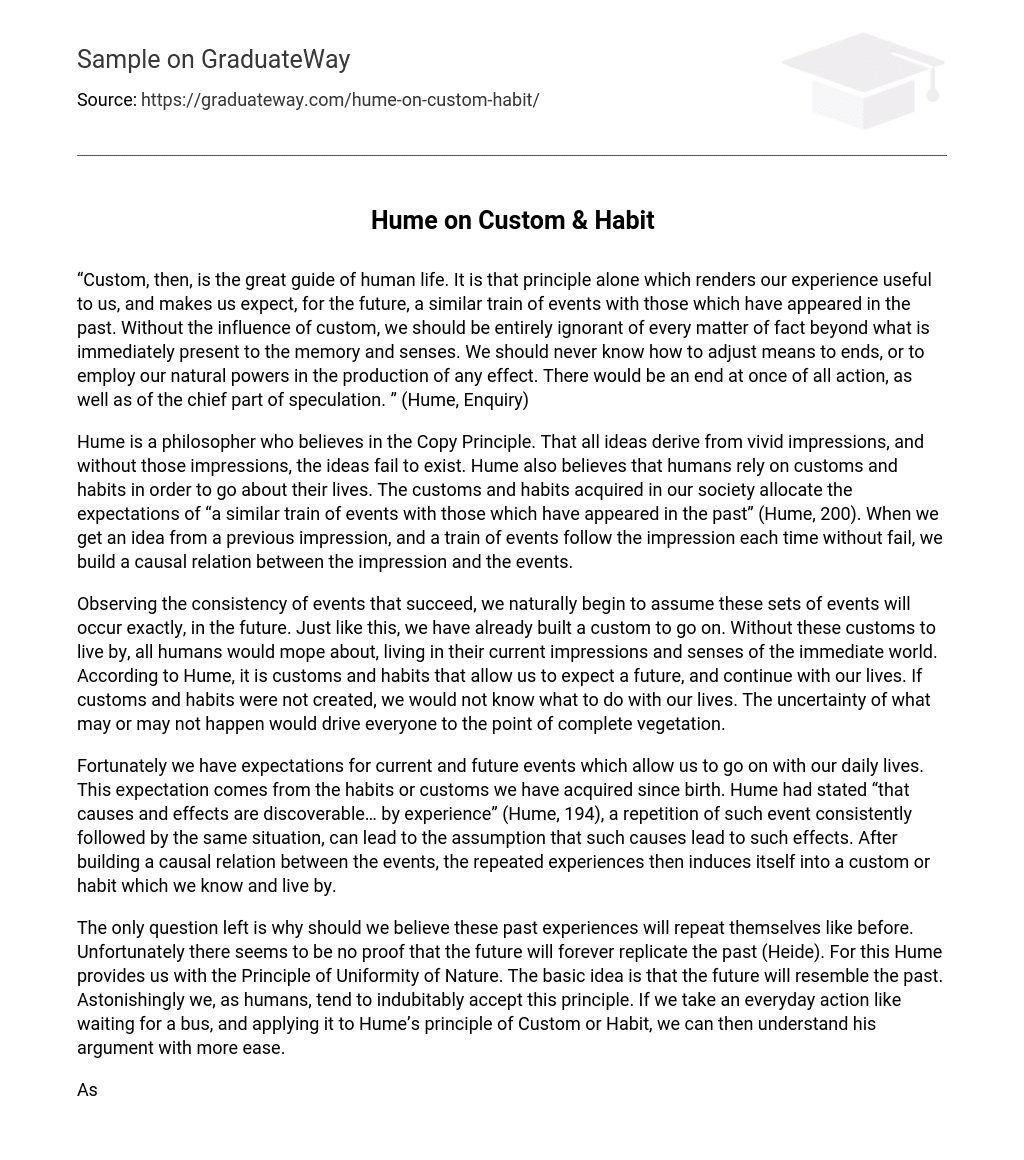“Custom, then, is the great guide of human life. It is that principle alone which renders our experience useful to us, and makes us expect, for the future, a similar train of events with those which have appeared in the past. Without the influence of custom, we should be entirely ignorant of every matter of fact beyond what is immediately present to the memory and senses. We should never know how to adjust means to ends, or to employ our natural powers in the production of any effect. There would be an end at once of all action, as well as of the chief part of speculation. ” (Hume, Enquiry)
Hume is a philosopher who believes in the Copy Principle. That all ideas derive from vivid impressions, and without those impressions, the ideas fail to exist. Hume also believes that humans rely on customs and habits in order to go about their lives. The customs and habits acquired in our society allocate the expectations of “a similar train of events with those which have appeared in the past” (Hume, 200). When we get an idea from a previous impression, and a train of events follow the impression each time without fail, we build a causal relation between the impression and the events.
Observing the consistency of events that succeed, we naturally begin to assume these sets of events will occur exactly, in the future. Just like this, we have already built a custom to go on. Without these customs to live by, all humans would mope about, living in their current impressions and senses of the immediate world. According to Hume, it is customs and habits that allow us to expect a future, and continue with our lives. If customs and habits were not created, we would not know what to do with our lives. The uncertainty of what may or may not happen would drive everyone to the point of complete vegetation.
Fortunately we have expectations for current and future events which allow us to go on with our daily lives. This expectation comes from the habits or customs we have acquired since birth. Hume had stated “that causes and effects are discoverable… by experience” (Hume, 194), a repetition of such event consistently followed by the same situation, can lead to the assumption that such causes lead to such effects. After building a causal relation between the events, the repeated experiences then induces itself into a custom or habit which we know and live by.
The only question left is why should we believe these past experiences will repeat themselves like before. Unfortunately there seems to be no proof that the future will forever replicate the past (Heide). For this Hume provides us with the Principle of Uniformity of Nature. The basic idea is that the future will resemble the past. Astonishingly we, as humans, tend to indubitably accept this principle. If we take an everyday action like waiting for a bus, and applying it to Hume’s principle of Custom or Habit, we can then understand his argument with more ease.
As we wait by a bus stop, we assume that within reasonable time the next bus will roll on by, stop to meet the passengers, and bring us to our destination. This simple task of catching a bus is a perfect example of Hume’s Custom. By custom, transit patrons are to wait for an upcoming bus at a designated stop, rather than to roam around the streets, hoping for a bus to pick us up. We patrons assume that a bus will eventually appear due to our previous experiences with public transit, and the acceptance of the Principle of Uniformity of Nature. In assuming and expecting, we have already made it a custom to wait for the bus to arrive.
The causal relation we build, in this case, would be that the cause of waiting for the bus provides the effect of catching one. Hume has concluded that Customs and Habits attained from past experience are necessary for us to navigate about the world. When these experiences are repeated and the outcomes are consistent, we build a causal relation between the ideas and naturally accept the Principle of Uniformity of Nature. With this we have created a custom by which grants us the reason to look forward to and expect for the future. The absence of custom and expectance may lead to a meaningless and aimless life.





